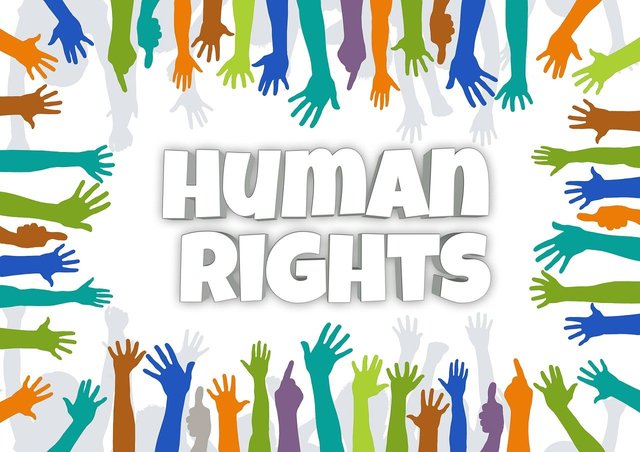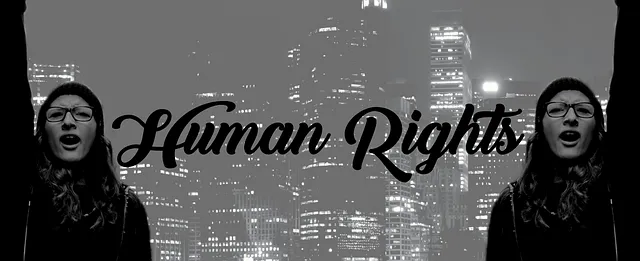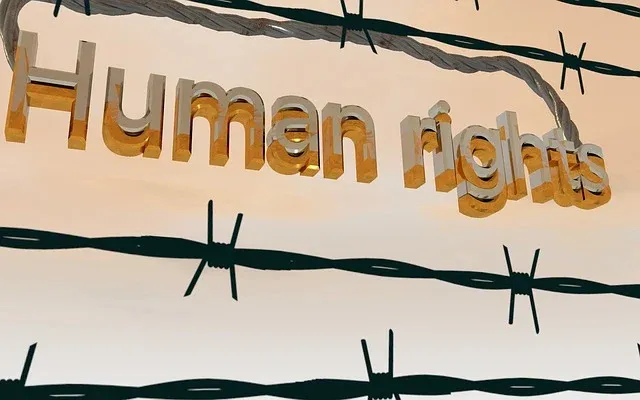Human rights are the basic rights to which everyone is entitled, regardless of gender, religion, ethnicity, or nationality.
-. Based on what was explained in class, state in your own words and with explanations whether you consider that human rights are respected or violated in your country.
In my country, Nigeria, the government has made meaningful progress in promoting human rights. They went as far as approving various international human rights systems, like the International Covenant on Civil and Political Rights. Yet violations of these rights still continue. Some of the violated rights in Nigeria are:
Women's and children's rights: Most women and children in Nigeria are often deprived of their rights; they suffer violence and discrimination, girls are denied access to education, and are being forced into early marriage.
Police Brutality: Police at times often use excessive force on their victims, which may lead to the death of even innocent people, especially the Special Anti-Robbery Squad (SARS), which may eventually lead to protests like EndSARS.
Freedom of speech: Most citizens and journalists are usually arrested for expressing their opinions or criticizing the government on certain issues within the country.
Education and Healthcare: The government fails to take it as a serious responsibility to provide infrastructure and funding to these sectors in order to improve the living standards of the citizens.
-. Please state, according to the laws of your country, whether Human Rights have the same value as the Constitution of your country, whether they are supra-constitutional, or whether the Constitution prevails over international treaties on Human Rights.
In Nigeria, the Constitution is the supreme law of the land (The Constitution of the Federal Republic of Nigeria 1999). The law states that "This Constitution is supreme and its provisions shall have binding force on the authorities and persons throughout the Federal Republic of Nigeria."
Nigeria, in agreement, has signed diverse international human rights treaties, such as the African Charter on Human and People's Rights and the International Covenant on Civil and Political Rights. The Constitution states that "No treaty shall have the force of law except to the extent to which any such treaty has been enacted into law by the National Assembly."
The Fundamental Human Rights, which include the right to life, liberty, and dignity, are enclosed in Chapter IV of the Constitution.
Relationship Between Human Rights and the Constitution
The Constitution prevails on issues of conflict between the Constitution and international human rights treaties, interpreting the Constitution to comply with international human rights standards.
Human rights are protected as constitutional rights and are to be enforced through the courts.
-. Mentioned any organisation in your region that has jurisdiction over human rights. In your opinion, how useful it has been and how its operation has influenced respect for human rights in your country.
| National Human Rights Commission (NHRC) |
|---|
The NHRC operates on the mandate of inquiring into human rights, monitoring their situations, and rendering suggestions to the government for the purpose of promoting and protecting human rights in Nigeria.
- Usefulness
The NHRC has played an important role in promoting human rights awareness and examining abuses of rights. Although its effectiveness is limited due to inadequate funding and enforcement.
- Influence
Due to the effective contributions made by the NHRC in promoting awareness about human rights in Nigeria, their operations in addressing human rights abuses are meeting with success, thereby influencing government policies and actions.
- Have you or someone close to you been a victim of human rights violations? If so, what was the situation and were you able to assert your rights?
There was a situation that occurred in my locality.
It was about a lady of about 27 years of age. Her name is Cynthia; she is a journalist and resides in the neighborhood.
She was running an investigation into government corruption within the state. According to her, she had been receiving threatening messages from unknown sources warning her to withdraw from investigating the story, but she insisted on the investigation.
On a fateful day, it was getting dark already, but she wasn't returning from work. Her junior sister, with whom she stays, decided to check on her. She came back narrating the story that Cynthia was arrested that evening while leaving her office by a group of policemen without uniforms. According to the policemen, they claimed she was spreading false information about the government. She was arrested and taken to a detention center, where she stayed for several days.
During this period of detention, Cynthia faced both physical and emotional abuse. She had no access to her lawyer, medical care, or her relatives. She was forced into doing certain things, including signing an agreement admitting to the alleged crime. Her phone and laptop were taken away and confiscated.
Despite what Cynthia was facing, she was determined not to let her rights slip away. She acknowledged that as a journalist, she is entitled to freedom of expression and the right to seek and impart information.
Human rights organizations offered to help. With the assistance of her lawyer, Cynthia was released from detention. However, the experience she had became a nightmare for her; she lived in fear and struggled to cope with her work as a journalist.
| Asserting Her Rights |
|---|
Cynthia insisted on taking action against her arresters. She filed a complaint with the National Human Rights Commission (NHRC) and sought justice through the courts.
The NHRC investigated Cynthia's case and confirmed that her rights were violated. The commission urged the government to take action against the perpetrators and provide compensation for her ordeal.
The court faced a lot of challenges in rendering justice, but Cynthia was not eager to give up. The human rights organizations, her family, and friends provided her with a lot of support, which gave her the courage to stay focused.
Finally, the court ruled in favor of Cynthia, admitting that her rights were violated and ordering compensation for her from the government.
Cynthia's experience exemplifies resilience in acknowledging human rights violations. She refused to give up and insisted on defending her rights despite the challenges.
Cynthia's case clearly reveals the importance of human rights organizations and the NHRC in protecting human rights in Nigeria.
Currently, Cynthia is working as a journalist. Through her experience, she has been able to advocate for human rights. Her experience shows that we can assert our rights and seek justice.
Case study 1.
A woman loses her son when he dies at the hands of assailants who kill him to steal his car. The assailants are later arrested and prosecuted for the murder. He is serving the sentence provided for by law. However, the woman believes that her right to life has been violated and decides to file a complaint with the Inter-American Commission on Human Rights.
Please state whether you believe that the human rights of the victim in this case were indeed violated and whether the complaint to the aforementioned body should be admitted or not. Explain your answers.
| Human Rights Violation |
|---|
The human rights of the victim (the woman's son), who was intentionally killed by the assailants, represent a clear violation of rights. This violates the right to life, which is a fundamental human right enshrined in various international instruments, such as the American Convention on Human Rights.
Complaint Admissibility and Reasons
Concerning the complaint filed by the woman with the Inter-American Commission on Human Rights (IACHR), it may likely not be admitted.
Reasons
The IACHR commonly considers complaints filed by the victim. In this case, the victim is deceased, and the complaint was filled by the mother instead.
The IACHR recommends that all available domestic remedies be exhausted before submitting a complaint. In this case, the domestic justice system has already addressed the crime; the assailants were arrested, prosecuted, and are serving their sentences.
The IACHR might not consider the claimed complaint valid. Although the right to life of the son was violated, the complaint filed by the mother appears to favor her own emotions over violations of her right to life.
Case study 2.
A person is arrested in the middle of an anti-government protest. He is beaten by police officers, resulting in his death. The prosecutor assigned to the case begins the investigation without being able to precisely identify the perpetrators of this murder. Several years go by and the victim's relatives turn to the prosecutor's office for an answer, and are told that the case has been closed because several years have passed without being able to identify the officers who caused the death.
Please state whether you believe that the human rights of both the victim and his/her family are being violated. Explain your answers.
| Human Rights Violations |
|---|
In this case, it is clear that the human rights of both the victim and the family have been violated.
| Victim's Rights |
|---|
Right to Life: The victim was beaten to death by the police officers, which violates the victim's right to life.
Right to Humane Treatment: The victim was denied the right to humane treatment and freedom from torture; therefore, this right was also violated.
| Family's Rights |
|---|
Right to Truth: The family has the right to know the cause of the victim's death and those responsible for it. However, in this case, this right was violated.
Right to Justice: The right to justice was also violated, as the family was denied the ability to hold those responsible for the victim's death accountable and to seek compensation.
Right to Non-Repudiation of Responsibility: The state violated this right by closing the case without finding those responsible for the victim's death or providing compensation to the victim's family.
The state has an obligation to
Carry out an effective, thorough investigation into the cause of the victim's death.
Ensure that those responsible for the victim's death are prosecuted according to the law.
Make the perpetrators provide reparations to the victim's family.
Human rights are universal, inalienable, and interdependent and are crucial for human dignity and well-being.
Thanks for reading through friends ❤️
I will invite;
@imohmitch
@precious9
@us-andrew
Cc,
@anasuleidy



https://x.com/Promisezella/status/1875173546558996683?t=Juh1YiuHYPgCSCZe2n5djg&s=19
Downvoting a post can decrease pending rewards and make it less visible. Common reasons:
Submit